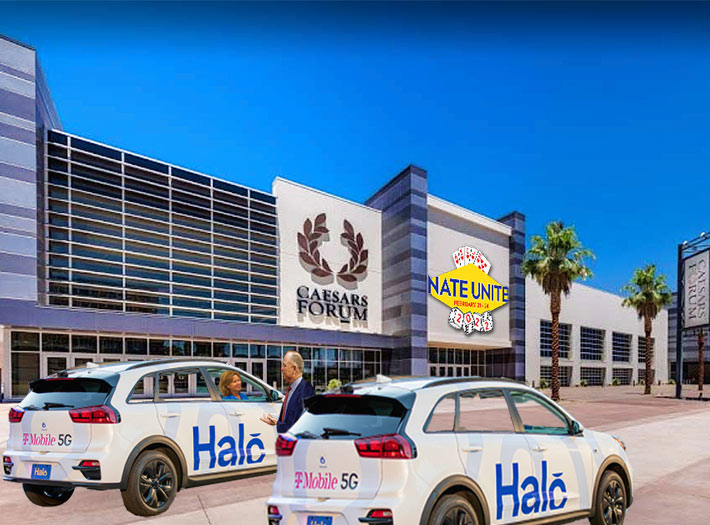
NO NEED TO TIP — Las Vegas conventioneers will not have to rate their behind the scenes electric Halo vehicle driver or feel obligated to ask them how their day is going, especially if they just lost three large at the casino. The driverless service is expected to be available later this year.
Yesterday, Halo launched one of the first commercial driverless car services in the U.S. running on the T-Mobile 5G network in Las Vegas. With Halo, visitors and residents can quickly summon a sleek, driverless all-electric Halo with the push of a button. A driverless Halo then arrives at the pick-up location and the rider hops in and drives to their destination.
Halo has operated on the T-Mobile 5G network since it began driving on Las Vegas’ public roads earlier this year. Halo is collaborating with local municipalities to accelerate the adoption of electric vehicles (EVs) to address traffic congestion and carbon emission challenges by connecting public transit systems to on-demand, driverless cars. The company expects to begin offering rides to customers later this year with service initially available in urban parts of the Las Vegas Valley. When fully deployed in the city, Halo has the opportunity to replace the need for thousands of personally owned cars, creating a more traffic-free, carbon-free, blue-sky world.
“Fueling this kind of startup innovation is part of why we’ve built the biggest, fastest and most reliable 5G network in the country,” said Mike Sievert, CEO of T-Mobile. “Innovation and driving change for the better is our DNA at the Un-carrier, and we’ve unleashed a 5G network that will transform industries and change our world for the better. I can’t wait to see what comes next as we work with startups, developers and entrepreneurs like Halo building the next big thing in 5G!”
Halo said its service is safe and easy to use. Riders will simply summon a driverless EV via a mobile app. A driverless Halo arrives at the pick-up location and the rider hops in and drives to their destination. Upon arrival, no parking is needed — the Halo moves driverlessly to its next pick-up location.
With its proprietary RemotePilot technology, Halo trains in-house drivers to remotely operate the driverless car over T-Mobile’s 5G network. Halo has developed an Advanced Safe Stop mechanism enabling its cars to immediately come to a full stop if a potential safety hazard or system anomaly is detected. Using an advanced Artificial Intelligence algorithm, the car also learns in the background while humans control the vehicle, building a unique feedback loop to achieve Level 3 capabilities over time.
“Full autonomy is a massive challenge from both a technical and social trust perspective that won’t be solved for years to come,” said Anand Nandakumar, the founder and CEO of Halo. “But Halo has been designed to address these challenges by building automation over time starting with a solution that consumers will feel comfortable using today.”
Halo, a graduate of the 5G Open Innovation Lab co-founded by T-Mobile, is an early leader in driverless and autonomous car technology. Founded by executives from Uber, Cruise Robotics, Proterra, Amazon, and more, Halo is poised to serve a global $2.5 trillion-dollar transportation market creating local jobs with an innovative, on-demand car-sharing model.
“For years, Nevada has been a hub for innovation in autonomous vehicles and a leader in this space,” said Justin Jones, Clark County Commissioner of District F and Vice Chair of the Southern Nevada Regional Transportation Commission. “Halo and 5G technology offer an intelligent transition between where we are today and where we want to go in the coming years, giving residents and visitors a better, more energy efficient way to move throughout this great city.”
“Driverless vehicles require a network with high capacity, broad coverage and low latency, making T-Mobile 5G a perfect match for developers such as Halo,” said John Saw, EVP of Advanced & Emerging Technologies at T-Mobile. “There is a lot of work to do on the path to full autonomy, and Halo is taking a unique and intelligent approach to get there.”


















